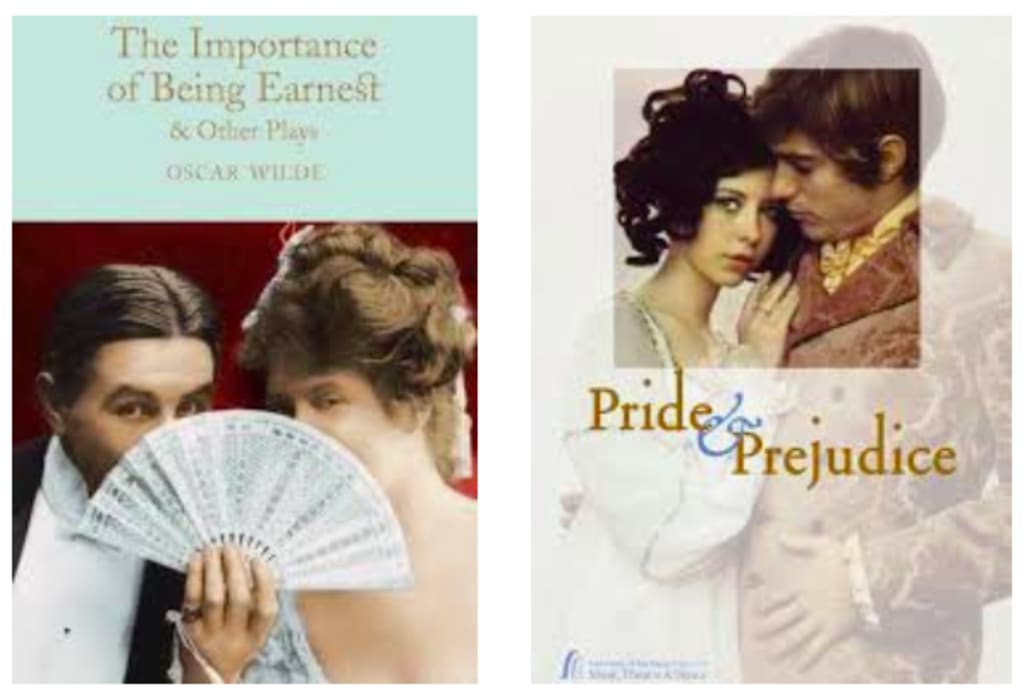
Jane Austen’s, Pride and Prejudice and Oscar Wilde’s, The Importance of Being Earnest, set in eras when respectable values were honoured, examines the struggle with conflicting issues created by love. Common conflictions arise from love, as both authors challenges society’s conventions of the non-existing relationship between love and marriage. The idea of the pursuit to acquire a love, is delved into as deceiving charismatics are developed by Austen’s serious tone opposed to Wilde’s satirical language. Both texts evidently confront the traditional expectations of women provoking the audience to evaluate gender equality and discrimination towards women. Through the idea of love creating conflicting issues both authors endeavour to challenge their audience to question the worth of love compared to the ideals within current society.
Austen and Wilde explore the idea of love creating conflicting issues through their character’s deceitful actions in the process of gaining affection. Austen’s Wickham and Wilde’s Jack and Algernon share similar deceitful tactics to achieve their goals by creating false identities. Wickham is introduced through Austen’s verbose description as he is “the best part of beauty.” By persuading civilians of Hampshire and giving the impression to the audience that he is the brother “that has all the goodness” compared to Darcy who has “all the appearance of it.” This is ironic as the audience learns Wickham “is not to be trusted,” as he deceives the Bennet family, depicting to the audience the betrayal Wickham has inflicted. Unlike Austen, Wilde utilises a satirical tone in Jack’s and Algernon’s characterisation as they produce false identities. Creating the conflicting issue of making their beloveds believe their names are Ernest. Ironically Wilde uses repetition as Gwendolen and Cecily complete their fantasy “to love someone whose name was Ernest,” constructing dramatic irony amusing the audience and satirising marriage as in Victorian times, marriage was about business rather then love. Dramatic irony is used as Jack and Algernon respond to their partners in similar manners asking if they “couldn’t love [them] if [their] name wasn’t Ernest” creating a satirical tone. By satirising Victorian beliefs in marriage within Jack and Algernon’s absurd situation Wilde prompts the audience to consider if marriage should be about love. Contrastingly, Austen creates a negative atmosphere for the audience as Miss Bingley’s “imprudence” due to her deceitful jealousy of Elizabeth. Miss Bingley bates Elizabeth to make a false error, her tone is expressed to be “with sneer civility," as Austen uses oxymoron emphasising Miss Bingley's loathing towards Jane, encouraging the audience to dislike Miss Bingley and expose the uncivility seen in upper-class people being reflective in the Regency era. Jealousy between Cecily and Gwendolen differentiates from Miss Bingley’s as Wilde is using it as a point of humour. During Gwendolen’s and Cecily’s conversation, their passive-aggressive tone is expressed through stage directions as “Gwendolen bites her lip, and beats her foot,” making the audience recognise Gwendolen’s loathing of Cecily. Food is symbolic throughout the play as it is a device to prompt conflict between characters. Cecily deliberately places, “a large slice of cake,’ on Gwendolen’s plate instead of bread and butter. Similarly to Austen, Wilde exposes the uncivility of the upper class, triggering the climax of their quarrel. Austen's and Wilde's characters become deceiving in their pursuit of love, as both authors exaggerate the punctilious expectations of respective societies.
Austen and Wilde’s characters’ tamper with society conventions to complete their desires of love. Lydia’s “false step,” of premarital relations with Wickham challenges society’s conventions of the Regency era as a women’s virtue was highly upheld. Austen describes Lydia’s “passion [being] stronger than virtue,” implicating to her audience Lydia conforms against the conventions of society and creates conflicting issues in her pursuit for love. Austen emphasises Lydia’s impurity through symbolism as Lydia has, “a great slit in [her] worked muslin gown,” symbolising Lydia’s actions to cause her to become what society considers impure. A muslin gown is made of a delicate white material; white is a colour symbolising purity this is ironic as the audience know Lydia is impure. Wilde produces a similar character, Cecily, who like Lydia conforms against the constraints of society as Cecily fulfils her desire for love. Wilde uses dramatic irony as Cecily believes herself to have “been engaged” without permission to Ernest who is actually Algernon, influencing the audience to be amused by Cecily’s boldness. Wilde’s stage directions indicate Algernon “kisses” Cecily; during this era it was considered inappropriate to kiss someone before marriage, positioning the audience to be shocked by Cecily’s actions and expresses Wilde’s opinions of having the right to express love freely. Cecily and Lydia break with society's conventions to satisfy their desire of love creating issues for other respective relations by lowering their status in class. Austen uses metaphorical language as Elizabeth felt, “Her power was sinking” due to Lydia’s “proof of family weakness, such an assurance of the deepest disgrace.” Elizabeth sinking reflects her dropping status in class, supported by the haunting tone created by the assonance and sibilant ‘s’ sound positioning the audience to acknowledge Darcy conforms against society formalities by marrying Elizabeth. Correspondingly, though dialogue Wilde informs the audience Miss Prism and Dr Chasuble conform against society as the “Primitive Church [is] distinctly against matrimony.” For characters to achieve their desire of love Austen and Wilde investigate the conflicting issue of conforming against society’s conventions.
From a feminist perspective Austen’s and Wide’s text explores the expectations of women in their respective eras. Austen protests women’s equality through Elizabeth who represents a strong feminist role model to her audience. In Elizabeth’s refusal to Mr Collins, Austen’s use of hyperbolic imagery Elizabeth is not “the affection and coquetry of an elegant female,” expressing to the audience Elizabeth’s values independence over “her duty.” Wilde contrastingly, mocks the notion of women’s independence in euphemistic dialogue as men have “physical courage [that] women know nothing about,” clearly stating to the audience of women’s inability of independence. Austen demonstrates women were expected to be “accomplished” in order to be an ideal to marry. This is articulated with repetition as Darcy describes “women must,” and “she must possess” certain qualities, persuading the audience Darcy has little interest in Elizabeth as she does not possess these qualities. Austen surprises her audience using the dramatic irony of Darcy’s character arc by his abandonment of the expectations of society by falling in love with Elizabeth. Wilde similarly displays the expectations of women to be “perfect” as the female characters within his text depict the expectations of women. Unlike Austen’s Elizabeth, Wilde describes Cecily to be a “sweet, simple, innocent girl,” portraying Cecily suits the expectations of women. Wilde’s Lady Bracknell advocates women like men in the Victorian era to associate business with marriage, as Lady Bracknell comments Cecily to have a “quality that lasts” referring to her wealth. Lady Bracknell breaks society’s conventions as women did not associate with business in the Victorian era due to being considered not intelligent. Wilde proves women are equals to men, positioning his audience to address the issue of discrimination towards women. Both authors express the expectations towards women to their audiences through the idea of love creating conflict.
Pride and Prejudice and The Importance of Being Earnest investigates love creating conflicting issues, persuading their audiences to reflect on the worth of love compared to the traditions and norms within their respective societies. Austen and Wilde persuade their audiences to address the absurdity of their respective society customs provoking thought towards changing the attitude towards women and the relationship between love and marriage.






Comments
There are no comments for this story
Be the first to respond and start the conversation.